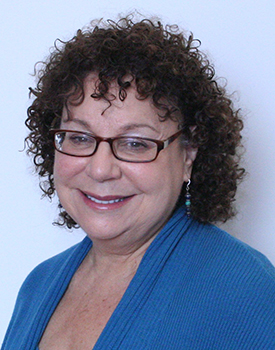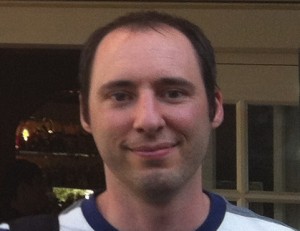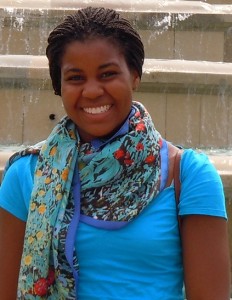Mischelle Brown, staff member in Housing and Residence Life & graduate student, Positive Organizational Development, the Weatherhead School
My project is an opportunity for CWRU students, staff, faculty and greater community neighbors to explore together their idea(s) of “ethics” by way of “place”. By introducing play, imagination and storytelling in an experiential learning style, we will:
- Understand “place”
- Observe how the human animal experiences “place”
- Discuss what “ethics” means
- Examine how these experiences in “place” inform an idea of “ethics”
- Reflect on whether or not interacting with each other in “place” affects “ethics.”
A primary purpose of my project is to co-create, in a diverse community, a set of parameters or guidelines that considers both the environment and the human when making ethical decisions.
Why did you become an Ethics Table Fellow? I became an Ethics Table Fellow to explore how the environment could be incorporated into understanding what ethics means.
What does “ethics” mean to you? Knowing who and where I am, what matters most, how to live well, how we live well together.
Susan Schick Case, Associate Professor of Organizational Behavior, Weatherhead School of Management
My project is a SAGES seminar called “Ethics for the Real World: Creating Your Ethical Code to Guide Decisions in Work and Life.” Its purpose is to address individual character development as a foundation for leadership integrity and moral courage. The developed code will draw on deeply held values from religious or spiritual teachings, upbringing, and/or culture as students become mindful of their inner voice. What does ‘right’ behavior require? The experience will equip them with a practice that fosters more ethical behavior in the University and in their future workplace. Alongside the class, I will conduct ongoing research to determine the role of such a course on character development.
Why did you become an Ethics Table Fellow? I wanted to be part of a community of people where I could explore how to help students develop moral courage, give voice to their values, identify what is right, and want to do the right thing.
What does “ethics” mean to you? Three values frame my view of ethics. All link to behavior. The first involves pursuing kindness, exerting oneself ethically on behalf of others with care and compassion, recognizing the infinite value in every life. The second involves “doing justice” to both shape and repair the world, including speaking up and giving voice to others. The third focuses on healing and transforming the world in a morally just way, taking responsibility to do the right thing and to empower my choices to make a difference.
John Frye, Ph.D. candidate, Department of Bioethics
My primary project this year is the design of an undergraduate course that examines ethical considerations surrounding the end of life. Modern death and dying have been medicalized, and there is need for greater reflection on and awareness of the complexities of the moral issues surrounding choices faced at such times. By teaching different forms of ethical analysis and exploring different cases that have arisen and shaped modern practices, such a course will help students encounter the importance of ethics in their lives and especially at its crucial moments. Case Western Reserve presents a unique environment for such a course, with the intersection of SAGES courses, pre-health students, bioethics resources, and the University Hospitals. As a secondary project, I have assisted other teachers integrate ethical theories and reflection within their own classes throughout the 2013-2014 year, including writing a primer that provides a succinct introduction to ethical analysis.
Why did you become an Ethics Table Fellow? I truly enjoy teaching, and was on the look out for a way to unite my unique interests and knowledge with Case Western Reserve University’s undergraduate education. The Ethics Table seemed a great way to build such a connection and provide a service to the campus community.
What does “ethics” mean to you? Ethics are the ways we individuals value our lives, our actions, and each other –including the actualization thereof. Each person has a unique approach based on their intuitions, backgrounds, relationships, and personality, but underlying it all is a search for right over wrong, an attempt to find and live the good life.
Denna Iammarino, full-time lecturer, Department of English and SAGES
I am exploring the practice of ethical interpretation, paying attention to how its methods can be integrated into courses across the university, SAGES particularly. Working from the premise that ethics can be a cultivated, sustained practice of perception, I hope to develop a series of lesson plans and exercises that train students to build upon their initial responses to texts (i.e. case studies, literature, social situations, cultural institutions, and so on). My questions mix self-reflection with textual questioning. My goal is to integrate an ethical dimension of inquiry into the classroom—a dimension that treats ethics and ethical interpretation not solely as problem-solving techniques, but as lenses that can be used to perceive and understand the self, the world, and the relationship between the two.
Why did you become an Ethics Table Fellow? I became a Fellow so I can explore the reaches of ethics, culturally, pedagogically. Our roundtable provides an invaluable opportunity to engage in such questions as: How do we, as individuals, gain knowledge? How does such knowledge shape our environment? How can ethics shape and influence this acquisition and creation?
What does “ethics” mean to you? Ethics is a way for an individual to evaluate and understand herself and her surroundings. It fosters engagement with her social and natural environment while transforming herself through changing her perceptions.
Ray Kelly, Integrated Graduate Studies, Departments of Psychology and Bioethics, active in Greek Life & a captain of Case Western Reserve University’s Baseball team
I want to make a space for students interested in the health sciences to talk about their shadowing or clinical related experiences. These experiences could be shadowing a physician, volunteering in an Emergency Department, or even a book a student read about being a doctor. This space would allow for learning through reflection and help students to realize whether or not this is a field they want to be a part of. It would help students to see the ethical issues that are key in the health sciences, whether in clinical care or research. There is not a space now for students in this area to reflect on clinical experiences, and I believe this will help students see the ethical issues as well as determine if medicine is the field they want to pursue.
Why did you become an Ethics Table Fellow? I became an Ethics Table Fellow through my bioethics coursework because I took a course on Kantian ethics and enjoyed it immensely. I wanted to continue my education in ethics through practice, and this opportunity gives the practice of doing ethics while learning about both theoretical and applied issues.
What does “ethics” mean to you? Ethics to me is a framework I use to determine whether an action or decision is right. My framework is always changing through my experiences with family, friends, coursework, spirituality, and general life experiences. The key for me is to keep love (agápē) in mind when making decisions.
Dan Lacks, C. Benson Branch Professor, Department of Chemical Engineering, CWRU
My project will incorporate ethics into CWRU engineering courses.
A. Through collaboration with a philosopher in the Ethics Table, I will develop teaching materials that describe how to systematically analyze engineering issues within the major philosophical theories of ethics – i.e., the consequentialist, deontological and virtue theories. Students will find current engineering issues with ethical questions (e.g., from newspapers or conversations with engineers), and learn how to analyze these issues in terms of these philosophical frameworks. The courses will range from first-year SAGES courses to senior design courses to graduate engineering entrepreneurship courses.
B. Through collaboration with a community leader/environmental ethicist in the Ethics Table, I am including an Urban Farm project in the chemical engineering senior design course I teach in Spring 2014. This project will involve a team of 5 chemical engineering students, who will work with the property owner and provide technical support for an urban farm being planned on a site where there had been abandoned houses on 84th St in Cleveland.
Why did you become an Ethics Table Fellow? I became an Ethics Table Fellow in order to develop some expertise that would allow me to include ethics in the courses I teach.
What does “ethics” mean to you? For me, ethics means doing the right thing. The challenge occurs when there are conflicting duties and it is not clear what the ‘right thing’ is.
Jason Walsh, Third-year undergraduate in the College of Arts and Sciences, Departments of Philosophy and Computer Science
My project focuses on the question: “how should we as individuals think about our own responsibility in relation to social injustice?” As individuals, we are not responsible for social and historical processes that have created what Iris Marion Young calls “structural injustice” along lines of class, race, gender, etc. However, some of us benefit and others are disadvantaged by these structural injustices. What is an ethical response to this situation? More specifically, I am interested in looking at this question in terms of the university (ours and in general) and education. What structural injustices allow some people access to education and deny it to others? What structural injustices do varying levels of access to education reproduce? What responsibility and capacity does the university as an institution have to alter these processes
Why did you become an Ethics Table Fellow? I became interested as a way to continue thinking about problems I struggled with in a philosophy course, Kant & The Banality of Evil. The Ethics Table has given me an environment where I have been able to read, think, and discuss in a less-structured manner than a semester-long course.
What does “ethics” mean to you? I take “ethics” to be broadly construed. A person’s ethics should inform her decision making, how she treats and interacts with others, what she sets as reasonable goals, etc. At the same time, I think Aristotle is basically right to argue that ethical theory cannot have the rigor and clarity of other areas of inquiry. No ethics will ever be a complete decision procedure that tells us exactly what to do in any context.
Lesley Whitaker, M.S. Candidate, Physics Entrepreneurship, Department of Physics
My project examines the history of American national crimes and the best remedies for their effect upon society today. Specifically in the realm of slavery and discrimination against black Americans, the goal of this project aims to create a medium that will encourage collective understanding, responsibility and steps forward available for the Case Western Reserve University community.
This project was inspired by the efforts made by Germany after the Second World War to atone for the crimes of the Nazi government. Although the effectiveness or worth of these efforts is subjective, in my opinion America has comparatively done little to face the crimes of its past, which is a problem I hope to remedy.
Why did you become an Ethics Table Fellow? I became an Ethics Table Fellow because it is the perfect outlet to focus my curiosity about the nature of collective guilt and morality. The Beamer-Schneider Lecture by Susan Neiman inspired me.
What does “ethics” mean to you? Ethics encompasses the thought processes behind –and the behavior stemming from- moral judgment and its complexities.








